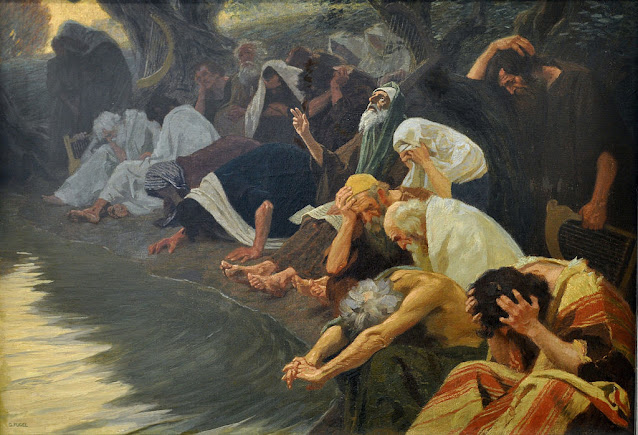As adults, we know this only too well. It has been a year since the disaster of the Covid pandemic turned our world upside down; in fact, it was this weekend a year ago that I announced that public Masses would be suspended for the foreseeable future. And in our personal lives too, we know how traumatic it can be when suddenly a loved one receives a difficult diagnosis, or a friend loses their job, or we experience some other sudden sorrow and heartache. Such moments are not only challenging emotionally; they can be spiritually disorienting as well. Sometimes, they can even lead to a crisis of faith. Why is God permitting this terrible thing?
Our readings today give us an insight into how to answer that question. We hear about two terrible events: in the reading from Second Chronicles, we are told about the destruction of Jerusalem and the Babylonian captivity, and in the Gospel, Jesus predicts his own future crucifixion and death. But in both instances, we are told how God brings forth something good from the evil situation. In the first reading, the Israelite people are able to return to their city and rebuild it, now with a deeper awareness of their dependence upon God. And in the Gospel, Jesus explains that the Cross, although terrible, will also be the means of salvation for all who believe in it. The point is that God’s love is always present, always enduring, even in what is terrible or disastrous, and in fact, sometimes he is using those very things to bring about something new.
 |
| Gebhard Fugel, By the Waters of Babylon (c. 1920) |
To be sure, not every disastrous thing is attributed to God directly. Often, our own poor choices are to blame: greed, lust, anger, fear, pride, hardheartedness – these emanate from the human heart, and our love for destruction means we reap what we sow, and others as well. And, of course, there are some disasters in which no one is at fault: natural disasters, or the continued pandemic, for example. But it is also true that nothing happens which God does not permit. When a terrible thing happens then, on the one hand it’s not correct to say, “God is punishing me,” but on the other, “God is allowing me to experience this for some reason, even if I don’t know what it is.”
In any disaster, therefore – public or private, communal or individual, the result of sin or something much more perplexing – what’s important is to consider our response. Will this terrible thing lead me to turn toward God or away from him? Am I able to believe in his love for me only when I experience good things or even as I experience this bad thing too? Do I trust that God can use this in some way for my own good, even if I can’t understand how right now?
I am reminded of another story about my niece and nephews that might be an example of what I mean. About a year ago, my sister had to take the three kids to the doctor for their inoculations, and each of them had a different response. The youngest, the baby, was distraught at the pain and unable to understand why it would happen: why would Mommy possibly allow this person with the pointy needle to prick me and make me hurt? The middle child understood the reason a little better: it would keep him from getting sick, but still it was painful and scary, and so he got upset. The oldest child handled it the best: the needle was frightening and no fun to experience, but she understood that her mother loved her and that she was allowing this to happen for her own good.
Perhaps we can think of the painful and sorrowful situations of our own life in this sort of way. Often what appears to us to be utter disaster can be the beginning of something new and even beneficial, even if we don’t understand how. Of course, whether we can recognize this depends upon the maturity of our faith. A person of deep faith will still experience very real sorrow and heartache, but they will also be able to handle those things better because they have trust in God and believe that what is happening is being permitted to happen in some way for their own good.
Friends, today’s Gospel reminds us of the ultimate purpose that God has for anything that happens to us: “For God so loved the world that he gave his only Son, so that everyone who believes in him might not perish but might have eternal life.” The disasters and sorrows and trials of our lives are all very much worth it – if they lead us to eternal life. And as Jesus tells Nicodemus, that depends upon whether we believe – whether we are ready to turn toward God, to believe in his Son, to come to his Light and live in his Truth, so that one day we may receive what he has eternally prepared for those who do.
1 comment:
Heartwarming message...as I have a friend whose husband is on hospice and slipping away...but to eternal life. This is especially touching me today...thank you for continuing to guide us. You are a shepherd to your flock.
Post a Comment